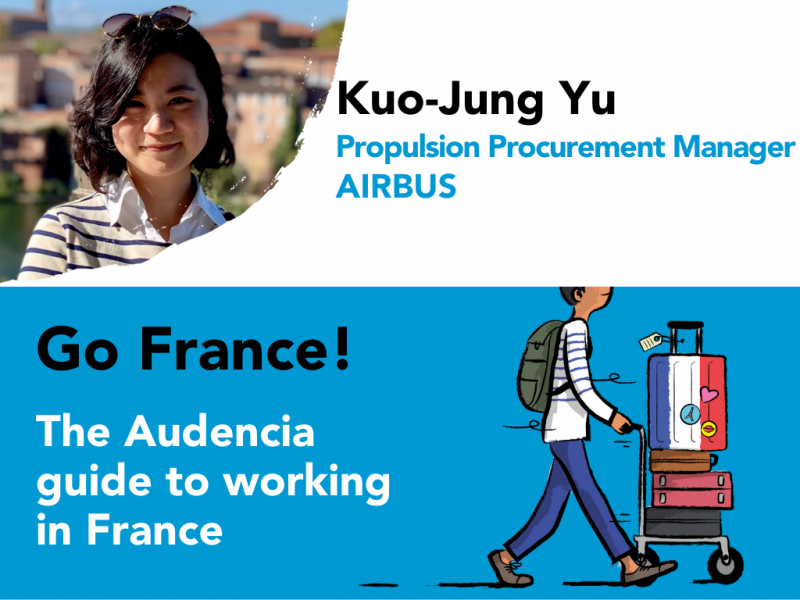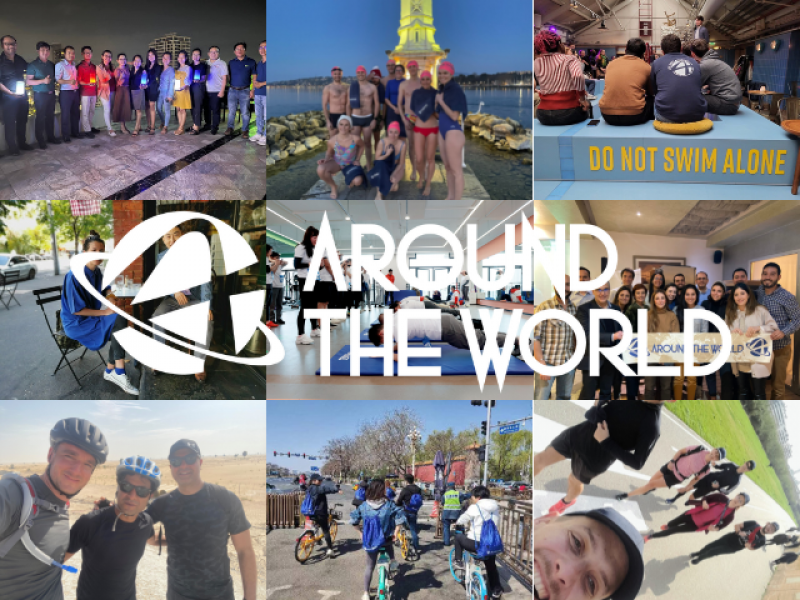#Iconic_Audencians: Esha Shrestha (MSc SCPM 17), a fascination for optimisation
- Career Center
- Le 17 mars 2023
Esha Shrestha, MSc SCPM 2017, Programme Manager, FLIX, Berlin
As a child, she proved to have a sharp eye for how things operate and a natural interest towards optimisation and efficiency.
A natural problem solver, she has been lending a hand at her parents’ business for as long as she can remember. “I must point out that I got involved out of interest and never felt forced”. Her journey took her to west Bengal in India where she studied engineering, Bangalore for her first quality analyst job, then Nantes and Milan where she followed a master’s degree in Supply Chain and Purchasing Management at Audencia. She moved to Paris where she learnt her trade at Nissan’s European headquarters. She has recently settled in Berlin after joining Flix, a leading German company offering intercity bus services in Europe, North America and Brazil. Having developed a long-standing fascination for Germany’s legendary efficiency, this last move was also an opportunity for her to experience the system from within.
A board game collector, a goal planner, and a rational thinker who clearly likes all her ducks in a row, it would be easy to label Esha as a strategy geek. But a different side of her is unveiled when she shares her interest in self-development books and her spiritual quest for freedom. A sign that one can be curious about the ``what`` and the ``how`` in their worldly activity, whilst also questioning the ``why``.


En savoir plus sur ...
Dans la même catégorie
-

Go France! Consider every challenge as a preparation for future ones so don’t be afraid of failure
Audencia's Career Center and Alumni teams are delighted to to bring you “Go France!”, the guide to working in France. Following the success of the first guide in 2019, this new updated edition revisits advice from HR professionals, input from intercultural experts and shares yet more experiences of working in France for internationals. Alumni say they choose France for its corporate culture and impact-driven working environment but also for its croissants! “Go France!” is a valuable resource for students staying in France after their studies at Audencia. This week, discover what Kuo-Jung Yu from Taiwan has to say. About Kuo-Jung: GRADUATED FROM THE MSC SCPM PROGRAMME IN 2019 FROM TAIWAN CURRENT POSITION PROPULSION PROCUREMENT MANAGER AT AIRBUS SAS IN TOULOUSE NATIVE LANGUAGE MANDARIN DAILY WORKING LANGUAGES ENGLISH OTHER LANGUAGES SPOKEN TAIWANESE AND FRENCH FRENCH LEVEL ADVANCED (B2/C1) LIVING IN FRANCE SINCE 2017 Kuo-Jung's key message: “Consider every challenge as a preparation for future ones so don’t be afraid of failure. Question yourself but not too much." My biggest challenge Expressing my own opinion! Giving ones’ own opinion or feedback clearly requires practice. It is kind of a natural thing for some cultures but not for me. Before giving an opinion, we need to reflect first. When I started working in France, I focused on making sure I was doing things right and proving my capabilities to my team. Sometimes, I missed opportunity to reflect on giving effective feedback. Myths & realities MYTH 35 working hours per week. People can work more than 45 hours in one week. REALITY A lot of paid leave! 25 days plus RTT, seniority, etc. My advice & top tips Picture what and where you want to be and anticipate what you need to do to get there. Then go for it! France is a country of freedom. Remember you always have the right to choose but don’t take it for granted. It's your responsibility to ensure you are capable of making the right choice. Quirky & cultural People say ‘hello’ and ‘goodbye’ in shops, on the bus and even in the mountains when you’re hiking past strangers. I really like this cultural behaviour, so I do the same thing when I’m back in Taiwan! And finally The French are not afraid to say, ‘I don’t know.’ At first, this annoyed me. However, I discovered in some situations it may be better to admit you don’t know something rather than giving answers you are not sure of. So now I appreciate it and have developed version 2.0 where I say, ‘I don’t know but I’ll check it out.’ Follow this link to read Go France in full:
- Career Center
- Le 21 déc. 2022
-

Go Germany! Your networks are your net worth!
Audencia's Career Center and Alumni teams are delighted to to bring you “Go Germany!”, the guide to working in Germany. This guide holds special significance as we celebrate the remarkable career of one of our esteemed professors, Uwe Supper, German Professor at Audencia and the Careers Adviser for Germany. Throughout his tenure, Uwe has adeptly crafted valuable connections between Audencia and Germany. Building on the positive outcomes of our previous guides, including Go France and Go Netherlands, it is now time for Germany to take center stage as a welcoming destination for our diverse community of students and alumni. As the economic powerhouse of Europe, known for placing a strong emphasis on efficiency, environmental awareness and a good work-life balance, Germany stands out as a compelling choice for all those in pursuit of an international career, and we are excited to help you discover the opportunities it offers. “Go Germany!” is a valuable resource for students and recent graduates wishing to head to Germany after their studies at Audencia. This week, discover what Victoria Gathogo from Kenya has to say. About Victoria: GRADUATED FROM THE MBA PROGRAMME IN 2017 FROM KENYA CURRENT POSITION: PROGRAMME LEAD AT WFP INNOVATION ACCELERATOR IN MUNICH NATIVE LANGUAGE: ENGLISH DAILY WORKING LANGUAGES: ENGLISH OTHER LANGUAGES SPOKEN: SWAHILI GERMAN LEVEL: BEGINNER BEEN LIVING IN GERMANY FOR: 5 MONTHS Victoria's key message: “Your networks are your net worth!" My biggest challenge Language barrier of day-to-day activities even though German is not needed for my work. Myths and realities MYTH: If you work in English and do not speak German it is easy to get by. REALITY: Robust systems, a strong work ethic, many multinationals in the market, and great expat communities. Harsh weather! My advice & top tips Soft skills are key and unlock opportunities for you, as most places have flat structures: public speaking, listening, how you run meetings, working with people from different backgrounds. Quirky & cultural Germans have a more consensus-driven approach, unlike in France where people are more individualistic and do things their own way, caring less if someone else stands to suffer from this. And finally... Great opportunities, work culture, and work-life balance. Follow this link to read Go Germany in full
- Career Center
- Le 14 mars 2024
Autres actualités
-

Cycles économiques et quantité d’argent sur le marché
Corrélation entre les valorisations des startups et les conditions macroéconomiques Une nouvelle étude de la Chaire « Finance pour l’innovation » d'Audencia, réalisée par Benjamin Le Pendeven et Max Berre, montre que les cycles économiques ont un impact direct et indirect sur les valorisations des startups. Dans l’environnement économique actuel chahuté, les auteurs ont voulu établir un nouveau modèle pour conceptualiser la valorisation pré-investissement. En 2020 et 2021, le marché du capital-risque (CR) a atteint des sommets historiques tant en termes de valeur investie que de nombre d'opérations, que cela soit en France, en Europe ou ailleurs dans le monde. Le nombre de licornes a également atteint des sommets, passant de 45 en 2014 à 1 058 en 2021 dans le monde. Cependant, comme le montre une nouvelle étude de la Chaire « Finance pour l’innovation » d'Audencia de nombreuses jeunes entreprises en situation de levée de fonds risquent de connaitre des tours de table plus difficiles compte tenu des conditions du marché. En effet, les récents troubles macroéconomiques ont des conséquences concrètes sur les valorisations des startups. C'est pourquoi le professeur Benjamin Le Pendeven, titulaire de la Chaire « Finance pour l'innovation » d'Audencia, et Max Berre, doctorant au sein de la Chaire, ont décidé d'étudier l’impact des facteurs macroéconomiques qui déterminent la valorisation des startups. Ils ont ainsi pu établir un modèle de corrélation entre les valorisations des startups et les conditions macroéconomiques. Certains facteurs macroéconomiques influencent fortement la valorisation des startups Dans leur étude, Benjamin Le Pendeven et Max Berre ont construit une base de données de 1 089 observations représentant 1 042 opérations sur 675 startups européennes entre 2000 et 2020. Ils ont ainsi pu déterminer dans quelle mesure les conditions du marché et les facteurs macroéconomiques influencent les valorisations des startups. Ils ont ainsi découvert que le cycle économique (c'est-à-dire les mouvements économiques continus qui se produisent dans un pays sur une période donnée) est le facteur d'évaluation le plus important. Cependant, les cycles économiques non seulement influencent les évaluations des startups par un impact direct, mais aussi par le biais de facteurs macroéconomiques et macro-financiers qui ont un impact indirect sur les évaluations des startups. Nous assistons donc à un double niveau d'impact : direct et indirect. Au niveau direct, les cycles économiques influencent les revenus des entreprises, la valorisation des actifs, les relations commerciales et la demande du marché, autant de facteurs qui affectent l'activité d'une entreprise. Au niveau indirect, ils influencent les primes de risque pays (utilisées par exemple dans les méthodes d'évaluation DCF) et la quantité d’argent investie par le capital-risque domestique (taille du marché du capital-risque chaque année). Il apparaît que le capital-risque domestique est le facteur le plus significatif, étant lui-même notamment influencé par les cycles économiques et les taux d'imposition. Alors que la « poudre sèche » (argent collecté par les fonds mais pas encore investi) est statistiquement importante, elle n'a qu'un effet mineur sur le modèle de valorisation. Cela signifie qu'une forte augmentation de cet argent à investir au niveau du pays n'entraînera qu'une augmentation relativement faible des valorisations des startups, et inversement. Ce résultat peut sembler contre-intuitif : alors que les données montrent que les taux d'imposition ont un impact négatif sur cette « poudre sèche », cette étude révèle que les taux d'imposition sont en fait positivement associés aux valorisations des startups. Ainsi, des valorisations plus élevées entraînent des impôts plus élevés, et non l'inverse. Les effets directs et indirects des facteurs macro-économiques sur la valorisation des startups L'étude montre que les relations entre les valorisations des startups et les conditions macroéconomiques du marché peuvent être modélisées comme une relation complexe, à plusieurs étapes et partiellement indirecte. Les auteurs ont donc ainsi constaté que l'impact sur les valorisations des startups est principalement déterminé par les cycles économiques. Même si d'autres conditions de marché macroéconomiques, telles que la prime de risque pays et l’argent investi en capital-risque, influencent les valorisations pré-investissement des startups, elles semblent agir essentiellement comme des canaux de distribution transmettant l'impact du cycle économique plutôt que comme des facteurs influençant la valorisation à part entière. Lire le document de travail en ligne. Méthodologie : Benjamin Le Pendeven et Max Berre ont collecté un ensemble de données de plus de 1 089 observations représentant 1 042 transactions sur 675 startups entre 2000 et 2020 sur lesquelles le modèle a été testé. Ils ont été aidés par Early Metrics (une agence de notation de startups, et la chaire "Finance for Innovation" d'Audencia). Les principaux paramètres à prendre en compte dans le modèle sont les cycles économiques, la prime de risque pays, le Cash-on-Market et d'autres indicateurs financiers comme le CAPM-Beta (une mesure de la volatilité, ou risque systématique, d'un titre ou d'un portefeuille par rapport au marché dans son ensemble) et le revenu de la startup. Les auteurs ont utilisé une approche de modélisation par équations structurelles qui leur a permis de prendre en compte divers paramètres tout en analysant des relations indirectes complexes, en évaluant les effets directs et indirects sur le processus d'évaluation des startups. Pour représenter les phases de contraction et d'expansion d'une économie qui forment les cycles économiques, ils ont choisi d'utiliser la variable clé de l'écart de production. L'écart de production est la différence entre la production réelle d'une économie et sa production potentielle. L'exécution du modèle sur l'ensemble des données fournit des informations à la fois sur le pouvoir explicatif des variables sur l'évaluation des startups avant le lancement et sur leur signification statistique. [Source : communiqué presse du 19/12/22]
- Business
- Le 14 févr. 2023
-

Around the World 2023 has begun!
Audencia's alumni go around the world from 24 March 2023 From 24 March onwards, Audencians across the globe will be celebrating the fifth edition of this annual event. On the programme: a two-week whistle-stop tour to meet up with some of our 4,000 alumni currently working overseas. Whether it's coffee for two in Melbourne (this is of course a nod to Ludivine Siret and Jin Sun who did just that in 2022) or a full-blown conference and reunion in Algiers, we are looking forward to seeing what our alumni come up with to highlight and celebrate their fantastic members. So, how does it work? Alumni ambassadors who wish to organise an event should contact the Audencia Alumni team with a proposal for an activity. It will be our pleasure to help set it up. For alumni who don't have a chapter nearby but would like to participate, drop us a line with a date, a time and a venue and we'll share the details with the alumni community. Register for an event in a city near you! In the run-up to Audencia Around the World, events continue to be added to the agenda, so please check regularly to see what is happening near you. The following destinations are currently on the map: Thursday 23 March (the "prequel") Singapore Friday 24 March Dubai Hong Kong Saturday 25 March Barcelona Los Angeles Sunday 26 March San Francisco Tuesday 28 March Montréal Wednesday 29 March Amsterdam Geneva Sao Paulo Thursday 30 March Casablanca Ho Chi Minh City London Sydney Toronto Friday 31 March Algiers Seoul Saturday 1 April Baku Fès Milan Shenzhen Tokyo Tuesday 4 April Brussels Luxembourg New York Zürich Wednesday 5 April Auckland Lisbon Melbourne Thursday 6 April Abidjan Munich Friday 7 April Phnom Penh Saturday 8 April Chengdu New Delhi Sunday 9 April Bengaluru Monday 10 April Bangkok Madrid Saturday 15 April (the "sequel") Shanghai Taipei Tuesday 18 April (the "after party") Mexico City
- Get Involved
- Le 20 mars 2023

